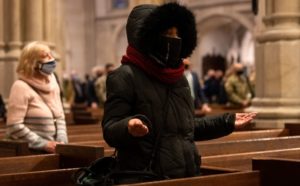
The CDC and FDA recommend pause for Johnson & Johnson vaccine, the Supreme Court halts California ban of home-based religious gatherings, and more…
IN THE NEWS
The Centers for Disease Control and Prevention (CDC) and the U.S. Food and Drug Administration (FDA) jointly recommended a pause in the administration of the Johnson & Johnson COVID-19 vaccine because of questions about six potential cases of blood clotting problems. The CDC Advisory Committee on Immunization Practices is reviewing the six cases of blood clotting out of the millions of individuals who had received a Johnson & Johnson vaccine. Beth Bell, a member of the committee and the director of the National Center for Emerging Zoonotic Infectious Diseases, reportedly advocated postponing the decision because there was not “enough information to make an evidence-based decision.” The committee will reconvene in 7 to 10 days to vote on a final recommendation. Johnson & Johnson also stated it will delay its vaccine rollout in Europe.
The U.S. Supreme Court ordered a halt to the enforcement of COVID-19 restrictions in California for home-based religious gatherings. A pastor and nine others challenged California’s restrictions banning home gatherings of more than three households as a violation of the Free Exercise Clause of the First Amendment. California argued that the restrictions did not violate the Free Exercise Clause because they applied neutrally to religious and secular activities alike. The Court rejected this argument, stating that government restrictions are highly suspect “whenever they treat any comparable secular activity more favorably than religious exercise.”
President Joseph R. Biden released his 2022 fiscal year budget proposal, requesting $1.52 trillion to increase funding for education, health care, infrastructure, and environmental protection. Fiscal budgets help to determine agency spending and regulatory potential for the year, and experts note the announcement signals a shift to funding domestic agencies from the Trump Administration’s focus on defense. The Administration’s proposal called for funding increases of 41 percent for the U.S. Department of Education, 24 percent for the U.S. Department of Health and Human Services, and 21 percent for the U.S. Environmental Protection Agency. If accepted, the Administration’s proposed budget would raise discretionary federal spending by 8.4 percent from the 2021 fiscal year.
Patients can now receive mifepristone, the “abortion pill,” through the mail according to a letter from FDA to the American College of Obstetricians and Gynecologists (ACOG). FDA’s decision responded to advocacy from ACOG and the Society for Maternal-Fetal Medicine. ACOG praised the agency’s decision for improving access to the drug because of individuals’ increased reliance on telehealth during the pandemic. FDA’s decision reverses an earlier move by the Trump Administration that required patients to continue going in-person to their doctor to receive the pill.
President Biden issued an executive order directing his Administration to impose economic sanctions in response to Russian efforts to undermine United States elections, commit cyberattacks, and for other instances of alleged corruption. The U.S. Department of the Treasury sanctioned Russian entities and individuals for interfering in the presidential election and issued a directive prohibiting United States financial institutions from engaging in certain dealings in Russian sovereign debt. Secretary of the Treasury Janet Yellen explained that these actions targeted “Russia’s malicious and disruptive cyber capabilities” by imposing sanctions to limit Russia’s ability to finance these activities. The Ministry of Foreign Affairs of the Russian Federation spokesperson Maria Vladimirovna Zakharova called the sanctions “aggressive” and promised a response.
Illinois became the first state to grant to individuals who recently gave birth an entire postpartum year’s worth of full Medicaid coverage—a significant increase from the previous 60-day postpartum coverage provided by the state health care program. The change was consistent with a provision in the American Rescue Plan Act that allows states to provide greater postpartum medical care. In approving the change in the Illinois program, the U.S. Department of Health and Human Services praised Illinois for serving as the model for other states that are expected to follow Illinois’s lead.
China’s antitrust regulator, the State Administration for Market Regulation, issued a record $2.8 billion penalty to Alibaba for flouting anti-monopoly regulations. The antitrust regulator, joined by the Cyberspace Administration of China and the State Taxation Administration of the People’s Republic of China, subsequently hosted a meeting where the government directed China’s 34 largest technology firms to undertake self-inspections to rectify any anti-competitive practices. Some experts argue that this action marks a change in China’s regulatory landscape because the country previously sought to promote entrepreneurship through minimal regulation.
Pursuant to the Marine Mammal Protection Act, the National Oceanic and Atmospheric Administration (NOAA) issued a permit for Hilcorp, an energy exploration and production company, to remove, capture, kill, or otherwise disturb four marine animal species in connection with the company’s oil and gas ventures in Cook Inlet, Alaska. NOAA found that Hilcorp’s activities would have a negligible impact on the species and that any adverse impacts on the species’ survival would not be unmitigable. In addition, NOAA deemed Hilcorp’s “mitigation, monitoring, and reporting” guidelines on the species as adequate. This is the third time the agency has authorized Hilcorp’s request for a permit in Cook Inlet, Alaska.
WHAT WE’RE READING THIS WEEK
In a forthcoming article in the Columbia Business Law Review, Daniel Tarullo, professor at Harvard Law School, discussed the application of administrative law to banking supervision. Tarullo explained that banking supervision differs from administrative functions carried out by other agencies. But banking supervision’s differences do not undermine its legality under administrative law, argued Tarullo. Once differences authorized by banking statutes are taken into account, banking supervision can be said to be compatible with administrative law.
In a forthcoming article in the University of Pennsylvania Law School’s Institute for Law and Economics Research Paper Series, Leo Strine, Aneil Kovvali, and Oluwatomi Williams argued that the United States is far from implementing a system where workers internally elect other workers to their company’s board of directors. Strine and his coauthors proposed, among other things, that the U.S. Securities and Exchange Commission should mandate that large companies disclose their environmental and societal impacts to investors and regulate communications, campaigning, and voting in company elections. Strine and his coauthors suggested that although investor pressure in the United States causes company directors to favor shareholders over employees, increased employee election regulation would create a more equitable future for company workers.
In an article in the California Law Review, Shelley Welton, professor at the University of South Carolina School of Law, argued that Regional Transmission Operators (RTOs), the independent operating organizations that control the electric grid, have become functionally privatized and resisted incorporating clean energy into the United States electric grid. Welton argued that RTOs resist green energy transformation because they have no “independent mandate to decarbonize.” Welton suggested that the Federal Energy Regulatory Commission or Congress should reform grid governance by reconfiguring the role played by RTOs, increasing state and federal oversight, policing corporate power, or increasing public control of electricity transmission.
FLASHBACK FRIDAY
In an essay in The Regulatory Review, Holly Doremus, a law professor at the University of California, Berkeley, argued that the U.S. Supreme Court’s disregard for the U.S. Fish and Wildlife Service’s designation of critical habitat for the dusky gopher frog would result in increased costs and administrative burden. Doremus asserted that the Court’s rejection of the Service’s understanding of critical habitat undermines its statutory authority and compels the Service to provide more justification for its endangered species habitat determinations. Doremus explained that the Court should have denied review of the case because the Service was authorized to determine the inclusion or exclusion of the frog’s habitat. Still, Doremus acknowledged that the decision will not result in different conservation outcomes if “the Service and the lower courts do their jobs faithfully.”



